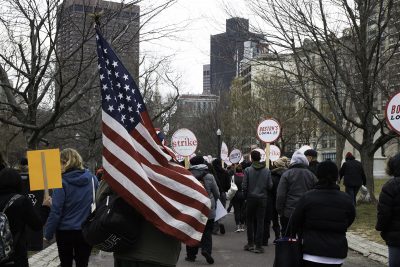
Following President Donald Trump’s inauguration Friday morning, several groups of protesters gathered Friday afternoon at the Boston Common for a demonstration called “Moving Forward United Boston.”
They stood in solidarity to support communities whose rights may appear threatened after some of Trump’s comments and cabinet appointments, according to Jessica Laverty, the organizer of the demonstration.
“If you feel affected, if you feel attacked, if you feel that in some way your rights are being violated, I want you to see that we have an ocean of people here,” Laverty said during the rally. “And we are not going to let people take our rights away.”
Several different groups of supporters came together and shared common concerns regarding Trump’s inauguration, including a group with “Anti-Fascist” signs and Boston’s Local 26, an organization protecting the rights of hospitality, food service, gaming and airport workers.
Laverty addressed all of the groups when she asserted the importance of standing together to protect each other’s needs.
“We’re here to show that we can gather peacefully and that you can express your needs,” Laverty said. “We’re not going to stand attacks upon gay rights … upon women’s rights. We’re not going to stand attacks upon the [Affordable Care Act].”
Laverty emphasized the need to take part in the political process and speak out on certain issues.
“Tomorrow you go home and you call our senators, and you make sure there’s not an assault on education, there’s not an attack on national parks, that the arts and humanities remain where they are,” Laverty said. “Stand up now more than ever.”
Laverty stressed her desire for the protests to remain peaceful.
“Carry your voice peacefully,” Laverty said. “We can all have an opinion and yet coexist. We go nowhere until we can prove we can stand for ourselves with respect.”
The gathering then relaxed into chants such as “this is what democracy looks like.”
By 4:00 p.m., the number of people and organizations present rose dramatically.
Lauren Jacobs, an organizer for the Boston People’s Inauguration, another gathering occurring that day, merged her crowd with Moving Forward United Boston.
Jacobs had the newly expanded crowd interact with each other.
“Turn to your neighbor,” Jacobs said. “Say ‘I am glad you’re here, and I will be with you through these next four years.’”
The groups then walked to Dewey Square Park, where another march back to the Common began.
Here, among speeches and chants, the crowd began to swell into the thousands.
Jacobs said those in attendance had to take on the responsibility of being their own heroes.
“Today’s the day our jobs begin as our own superheroes,” Jacobs said. “We are going to save this planet. We are going to save ourselves. We are going to save our communities.”
On the way back to the Common, policemen and organizers assisted in coordinating the march, as the protest escalated into a much larger movement.
Once the crowd arrived at the Common, Boston People’s Inauguration went through with a “swearing in” of different groups, including the LGBT community and the homeless.
Martin Henson, a leader of the Black Lives Matter movement in Boston, said despite the oncoming challenges, people must unite together “to rise against, to resist oppression and to protect each other.”
The crowd repeated Henson’s message of “rise, resist, protect” in a chant.
Several people who participated in the march spoke of the importance of protests like this.
Peter Berard, 31, of Watertown, said he was optimistic in light of the large gathering, but only saw it as a first step.
“This gives me a lot of hope,” he said. “The big thing to take from this is to remember to take people and organize them because it is not enough to just come out, chant, march around.”
William Harrigan, 26, of Watertown, said he was concerned about several issues under a Trump presidency.
“I’m worried about immigration reform,” he said. “I’m not sure what Trump’s doing with the military, but I don’t trust him with it due to his lack of government experience.”
Paul Fisher, 28, of Cambridge, expressed the need to give a voice to major demographics of the population.
“I’m disappointed in the election’s result against the popular vote,” he said. “The popular vote was pretty clearly in favor of Secretary [Hillary] Clinton. That makes it even more important to make sure that those that didn’t necessarily vote for Trump get to have a voice.”


















































































































